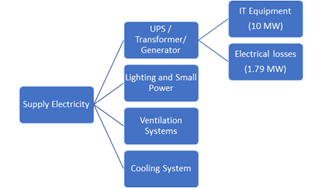 | 1 | initial version |
Hi @Bart Marcol ,
I hope it is not too late to respond to this question. We are currently working on modeling a data center and stumbled upon the same question. In our project, the team did not have enough details about the anticipated IT loads as that is supposed to be tenant responsibility. Hence we had to use the same IT loads in the baseline and design case models. Since the IT loads were almost 90% of the overall energy consumption, it was challenging to meet the minimum LEED requirements. Therefore, we suggested following an alternate compliance path for EA pre-requisite compliance but the project does not earn points due to this. Details related to this compliance path can be found here: http://www.usgbc.org/content/li-10291
Since accounting for all savings was very important to achieve compliance, we used the following approach:
How we modeled the electrical equipment load in the proposed design model: The electricity to the IT equipment (10MW - provided by the designer) is received from the UPS/Transformer/Generator. Since the electrical equipment have some inefficiencies in transferring power to the IT equipment, they are supplied with more power than 10MW. These losses (1.97 MW - provided by the designer) at the UPS/Transformer/Generator were modeled as the electrical equipment load (only for zones that contain the electrical equipment) such that 100% of this is transmitted as heat to these zones. In addition to this, 10MW of IT equipment were modeled for the zones that contain the IT equipment. The following flowchart illustrates the distribution of electricity in our models.

How we modeled the electrical equipment load in the baseline case: LEED CIR 10291 provides various options of selecting the baseline values for unregulated loads. We chose to use the values listed in ASHRAE 90.4 (2016) as the industry standard baseline value of the electrical equipment load.
Other approaches to comply with LEED EA prerequisite: We had to follow LEED CIR 10291 approach as the project team was not able to fill the exceptional calculation spreadsheet for data centers. Since you mentioned that you are referring to ASHRAE 90.1 2007, I believe that you are aiming for LEED v2009 certification. Our project is also aiming to meet the same requirements. We considered alternative compliance paths which may be useful to your project as well:
LEED Exceptional calculation spreadsheet for data centers. Details can be found here: http://www.usgbc.org/resources/minimum-energy-performance-data-center-calculator
Based on the energy source of the project, choosing an alternative metric can also be an option for data centers. Details can be found here: http://www.usgbc.org/node/7489432?view=language
We haven't yet received any comments from the LEED reviewers about our approach yet but I hope this helps.
Thanks, Raghu
